Philadelphia, Writers’ Problems, U.S. Presidents, French Gifts, Patriotism
Independence Day Dispatch
Happy Independence Day, Fellow Americans! And greetings, fellow travelers, wherever you may be!
Intermittent Signal has readers in some 67 countries, if the analytics are to be believed. I’m proud of that, and besides, I’m a pretty international guy. Today’s Signal, however, is focused on the United States, as is much of the nation and ROW, rest of the world as the publishers say, heading into a troubled election in troubled times. Perhaps you’ve heard something of these troubles? Are you very online, and have a deep (perverse?) hope that I say more, in the same vein? Or maybe you are just here for the pictures?
Philadelphia
We flew to Philadelphia a few days ago, a fitting thing to do at this time of year. [The Declaration of Independence was written and signed in Philadelphia in the summer of 1776, during the early days of the war against Great Britain. The Declaration of Independence, rather than the later Articles or Constitution, signifies the birth of the United States of America as a nation. We celebrate the event on “the 4th of July,” also called “Independence Day.”] As it happens, none of my wanderings had taken me to the City of Brotherly Love, no closer than I-95 sweeping down the Atlantic Coast, anyway, so I was excited to make the trip. Someplace new. Time to “visit with” our youngest, as we Southerners phrase it. See some great art and a bit of history, eat and drink well, absorb the city, spend time with my wife. I wasn’t even speaking.

The night before we left, Presidents Biden and Trump had what was by all accounts a terrible debate. The current President suffered publicly; the former President did well largely by comparison. Merely sick man in a cancer ward. Digital worries for the Republic spread like wildfire, like a virus (isn’t “viral” a telling way to characterize so much of our experience?), like mushrooms after a rain, like, oh hell, some other metaphor. Much gnashing of teeth, hand wringing, some gloating. Figuratively, of course, as I said, digitally. Nobody has teeth on the internet. Glad I watched a second-rate Australian mystery while packing.
Fair warning, gentle readers. I’m going to carry this sans souci attitude forward. Also, French stuff, which we Germans love very much. I’m not adding to your sense of doom. Most of you have got that already.
Philadelphia was a delight. I know, now is the time for the obligatory “a city with real problems.” Homelessness, drugs, crime, blah, blah. The first, at least, very visible. Just like the United States must constantly struggle to achieve its “unfulfilled promise.” Ho hum. It’s so easy to love being told what you already believe. Even when true, after a while the repetition is in bad taste.
The taste of Philadelphians, at least the wealthy in the late 19th century who shaped downtown, was Francophile. We stayed on Ben Franklin Parkway, self-consciously modeled on a Parisian boulevard, flanked by museums and sculpture gardens. (Franklin, by the way, was Ambassador to France, and a huge success.) The Parkway runs diagonally across the grid (like D.C.) and is bookended by the Philadelphia Museum of Art and the fantastic City Hall, French Renaissance Revival, claiming to be the world’s largest masonry building. Sure, whatever, it’s magnificent.
Flags line both sides of Ben Franklin Parkway, representing the nations whose people have found a home in Philadelphia in some significant number. Almost all the world’s flags are there. And that is a place to start thinking about the United States, as united nations, peoples. It’s truly marvelous, as idea and as astonishingly achieved reality in places like Philadelphia, to say nothing of New York or L.A. or the Indian family running a truck stop in central Kansas.
Over four days, almost all of it in public places, bustling airports, hotels, restaurants, pubs, museums, on the street (a lot), crossing parks and plazas, small stores, during the height of tourist season, at the pool – everybody was friendly. I know, it’s me. Sure, some Black kids walking behind us were listing an appalling variety of firearms (Glocks, Sigs, 328s, you da rabbit, send you to heaven -- be still my liberal heart), but they were trying to rhyme, to rap, to write a song. I’ll take it. In this highly polarized nation, blah, blah, I heard no real argument, certainly no rehash of the Presidential debate, none of the vitriol that I read daily. I read too much.
As I’ve already suggested, and things might be different out in Bala Cynwyd whence SIG makes global options markets, much of the vibe was Black, reminding me of Atlanta. In a good way. Polite yet warm, chatty, joshing among strangers. But hey, it was only four days, and the lion has yet to lie down with the lamb – no doubt all is not brotherly love. A lot, though, is.
Writers’ Problems
A for me unexpected benefit of becoming a writer is learning about what it is to write, and with that understanding, reading differently. I like this: “Sometimes one’s very angry and preaches, but I know that to clinch a point is to close it. To leave the reader free to decide what your work means, that’s the real art; it makes the work inexhaustible.” – Ursula K. Leguin
This quote is easy to find; I couldn’t find the source quickly. No matter. I think it is true, and this open-ended, suggestive, invitational, even seductive quality is much of what I find attractive about photography. More on that on another outing. For now, pity the poor writer, who has at least these two problems.
Practically, he (the writers I have in mind are almost all male) has to structure the piece. Suppose we are talking about politics, as one does. Incessantly. There seems to be nothing else to talk about, except maybe sports. So how are we going to structure our expression? Chronologically? Nietzsche says somewhere that the Germans should be credited for discovering history as a way of understanding, and that may be sort of true, although stories of decline are at least as old as Hesiod. Narrative runs deep in our psyche, may in some sense be our minds . . . Of course, there is always compare and contrast. Most of us learned that in high school. Putting the two together, we have “our politics are like ______, and that didn’t end well.” (Even if it ultimately did end well, or at least gave birth to the new.) So, in recent months, I have read overheated arguments that contemporary US politics is in some essential way “like” the U.S. Civil War, the French Revolution, and the waning days of the Soviet Union.
None of these arguments is particularly deep, or thoughtful, and I did not learn much. The recovering lawyer in me, however, rose like a trout to the fly. I wanted to marshal arguments on the other side, better arguments. Ho hum. There are many such trout; counterarguments abound. You can look them up. You’re on your own.
Stepping back, I remember, writers have needs, first and practically, to structure their texts, and second and psychologically, for attention. (Cutting close to the bone here.) These texts are not really essays (from French for trying), efforts to understand and express. These texts should, instead, be read as plaidoyerie, advocacy pieces, provocations, conceits. Too clever by half. Efforts at attention, at getting the trout to bite. And sometimes that can be a beautiful thing, watching the trout come up, but it is tactical rather than thoughtful, and in that sense not serious. As I’ve aged, I’ve found myself a little bored by and even contemptuous of my efforts to kill a gorgeous animal for mere sport. Anything for need, and family and friends, but . . .
Thinking About Presidents
So, what am I thinking about? In the spirit of LeGuin, with what should I leave you, gentle reader? Despite the dismissive attitude of this Signal, I am wondering about presidential politics. More specifically, and despite a lifetime of thinking about politics, I now realize that I don’t really understand parties at all. Maybe I should become more active, but that would be some expensive ethnography indeed. I am working hard to keep Intermittent Signal from being partisan (again, there’s no shortage of happy warriors and teams you can join), so without going into specifics, consider the quality of recent candidates. How does this happen?
I am musing on the unsettling thought that the institution of the Presidency may have grown from its Madisonian roots into a tree inappropriate for contemporary circumstances. What made a great deal of sense for a small polity dominated by a fairly homogeneous elite centered in relatively few places makes a lot less sense for a geographically dispersed and highly diverse polity of some 340 million souls. Let me suggest two vectors for thought: elections and administration.
With regard to elections, the sheer scale and diversity of the country fosters obsessions with brand, party support and therefore party dominance, incumbency, and gerontocracy. Hollywood has some similar problems.
Scale, roughly speaking, raises similar problems with regard to administration. The executive branch has 4 million people, if we count the military with its global commitments. Two members of the executive branch are elected, the President and the Vice-President. The structure of what most people think of as “the government,” then, is very hub and spoke. Broad swathes of policy, countless decisions, are funneled inward, ultimately shaped by relatively small teams surrounding the President. Is that reasonable?
French Gifts
As I’ve said, Philadelphia brought the French to mind. Some of this was circumstantial, for example the lovely bistro, fronting an urban park glowing dark green in the evening. Our prosperous son treated us; may he come to understand how that’s a blessing. Lionel Trilling talked about prosperity in late Shakespeare, arousing sentiments hardly dramatic and so subtle, easily mocked as mere greed or materialism, but there’s more, including love . . . I’m groping for something like a [theory] of the bourgeoisie, and comfortable experience, which brings me to Matisse. I’ve been engaged with Matisse for years, though I don’t really claim to understand. Toward the end of his life, Matisse claimed that he, like his friend Renoir, had painted every day. I had no idea how many paintings Renoir finished. He’s never been my favorite, and only now have I begun to see his paintings, especially the late post-Impressionist stuff, with its strange combination of soft brushwork, warm yet bright colors, and solidity. What does this suggest about a possible modernity?
French versions of Enlightenment thought, more, attitudes, informed Jefferson, in the Declaration of Independence and elsewhere (to the frustration of the Puritan Adams). The Marquis de Lafayette served with Washington, returned to France, and became an emblematic figure in the French Revolution, with all its consequences. High drama, great politics, conquests and rational triumphs. All of this matters, of course, but the drama dazzles and distracts, too.
Perhaps, in this season of our discontent, we should emphasize Tocqueville, a much more sensitive and indeed deeper thinker than Jefferson, who was only 33 when he penned the Declaration. I haven’t read enough, but Tocqueville wondered how our young republic, which had little overt government, functioned at all. His answer was governance, systems of social understanding, association, collective experiences, broadly shared beliefs and customs, “manners” writ large, all so hard to establish, and as we now see so clearly, so necessary. It is governance that rules, in the soft sense of orders, our collective experience. I’m speaking not only of prosperity, but the warmth of people in the street. For that we should be grateful, but we are rarely even conscious.
Instead of governance, we are conscious of our political heritage as argument. In some sense the United States was founded on argument, on the clash of ideas, in the Federalist Papers and elsewhere, and there has been plenty of argument since. And so, we argue and think we are doing politics, thereby missing much of our real politics. Especially if we are online. Yes, I’m aware of the irony of writing this online.
But Philadelphia, at least as I read the city, teaches us that more is at issue. For all the talk of polarization, the United States was never informed entirely by ideas, which would be impossible. I’ve argued that experience, including prosperity and for that matter homelessness, matter ever more to forming our consciousness of ourselves as a nation. Welcome to New Country: Music for Today's America We are coming to resemble, and have much to learn from, la France profonde (“deep France”) – we should come to recognize ourselves in American experiences.
In a couple of days, I’ll head back to the high country. I should get there in time for a drink in the summer evening sun. I will listen to the hummingbirds and contemplate a 14,000 foot mountain named after General Sherman, who burned the city in which I grew up generations later, and Lincoln, an even taller mountain. I will think about my country, and, in spite of everything, smile. Happy Fourth of July, citizens.
— David A. Westbrook












I appreciate the musings and the pictures too. The word that comes to mind is character when contemplating politics and politicians. It is character that recognizes and celebrates the beauty around us. It is character that prompts us to see each other and to appreciate our radical diversity. It is character that enables us to govern and be governed responsibly - for the common good. Dare one simply observe that “good” character is more like to yield prosperity for oneself and others, whereas “bad” character reflects dishonesty, corruption and other antisocial traits? If we elect and appoint persons of good character to lead us, there is a reasonable chance the body politic will flourish; if we elect and appoint persons of bad character, the body politic is doomed, I humbly suggest.
The most important observation about Thursday's debate is Biden [and Harris] are running nothing but a media colluding puppet show!
They are puppets and it doesn't matter how senile, demented, corrupt or cackling they are.
Two elected responsible for 4 million employees not counting huge numbers of contracted hangers on! C'mon man!
"Is that reasonable?" Worse than not reasonable, treasonous.
These democrats campaign on how lying and crooked the others are. How the others will destroy "our democracy" (huge prevarication) of war profiteers and imperialists
Dumping the senile puppet is the last , best chance to save the republic.